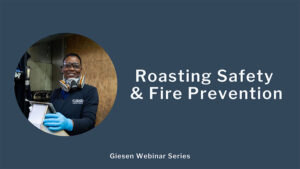
Fire Safety and Prevention – Giesen
Webinar about workplace safety and fire prevention at your roastery.


Recently, I was watching mega-funny Richard Ayoade’s “Travel Man,” where he was visiting a Cava (Spanish sparkling wine) tasting session and admitted that “this is like giving a very fine thing to an idiot. I have no palate… it seems fine…” He is not alone. Most of the time when I go taste wine with my friends, or we do the first coffee cupping with our students, I hear, “Oh, I have no taste” or “I can’t do this.” The truth is, everybody can do this. Actually, you are doing this every day as a part of the evolutionary “let’s not get poisoned” thing.
So without further ado, here are tips to make your world of gustation and olfaction a better, more confident experience.
Cats know it, dogs know it. Smelling your environment reveals a lot about your surroundings. Start to think about these smells. Where do they come from, what are they, good or bad. Once again, you are building your database of smells and aromas.
So many of our students try to fill out all the categories on the coffee cupping sheet after the first sip. They get frustrated and fall back on the “this seems fine” approach. I get it. Analyzing all the attributes of the coffee from the first sip is a very hard task. Instead, try to focus only on one attribute at a time. The first sip should be all about the flavor, then go back and try to analyze the aftertaste, come back again and work on acidity, then on body, and so on. As you develop more experience, you can combine some of the attributes. For example, I like to focus on flavor and aftertaste together. Also, assessing acidity and body makes sense to me. Balance is always something I leave to the very end so it is something like the grand finale for that coffee. But you might be different and for you, combining different attributes might make more sense. Obviously, this tip is more for professional tasters who are using a coffee scoring sheet or cupping form, but if you are a coffee enthusiast you can still focus on some of the attributes you find interesting. But still consider them one at a time.
I would encourage you to taste your coffee at different temperatures. If you are a professional taster, you already know this, but coffee changes at different temperatures. It is almost like a shape-changing art. You find different sensual stimuli at different stages. One important note, make sure you do not burn your tongue! At our campus, we ask students to touch the ceramic bowls and if they can hold them without feeling they’re too hot, the coffee is ready for exploration.
Stress is distracting and occupies a lot of bandwidth in your brain. The more stress you have, the less bandwidth is left for your taste and aroma explorations. There are days when you are in love, when you think of your next vacation, or a fight with an unreasonable barista who still calls espresso, expresso, and your brain can’t let go. Do not stress about it. This is not your day. Enjoy the company that is tasting with you and just move on. Maybe in a few minutes, hours, or the next day, you will do better.
Have you been at a coffee or wine tasting with people who do not smile, keep a strong poker face, pretend to know everything, make sounds when tasting, or educate everybody around them? Ok, that’s me when I am teaching or tasting coffee professionally, but I definitely avoid this in a nonteaching session. In any case, do not feel intimidated by these people. Part of the fun and learning process is sharing your honest impressions. They are your own, be proud of them. I know I am always super excited to hear the impressions of amateurs or kids. They tend to be especially refreshing and unique.
Sometimes the first impressions and gut feelings are right. As soon as you start to questions your first impressions you can overcomplicate things and fall into confusion.
An open mind is also very important. Fish sauce, pine, pipe tobacco, or Marmite in coffee? Yeah, I did come up with these descriptors in the past. Have an open mind, listen to your gut, and most importantly, have tons of fun!

Webinar about workplace safety and fire prevention at your roastery.
In September 2019 Willem visited Panama and made trips our farms Finca Sophia, Finca La Mula, and our newest finca La Cabra.

La mayoría de los profesionales del café están de acuerdo en que Panamá produce uno de los mejores cafés de este planeta. La famosa Panamá geisha continúa batiendo récords de calidad y precio.
